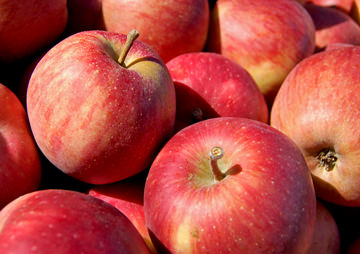You Can No Longer Eat American Apples in Europe. Here’s Why
Apparently an apple a day will not keep the doctor away in the U.S. Tom Gill (CC BY-NC-ND 2.0)
Tom Gill (CC BY-NC-ND 2.0)
Apparently an apple a day will not keep the doctor away in the U.S. A chemical called diphenylamine, or DPA, applied to apples after harvest has been troubling the European Food Safety Authority since 2008. The substance is used to keep apples from getting those aesthetically displeasing brown spots, but has “the potential to break down into a family of carcinogens called nitrosamines.” Yikes! No wonder EFSA officials wanted to know more about this chemical being sprayed on food people were consuming. But here’s what happened when they tried to dig up the truth, according to Mother Jones:
The industry came back with just “one study that detected three unknown chemicals on DPA-treated apples, but it could not determine if any of these chemicals, apparently formed when the DPA broke down, were nitrosamines,” Environmental Working Group shows in an important new report. (The EFSA was concerned that DPA could decay into nitrosamines under contact with nitrogen, a ubiquitous element, EWG notes.) Unsatisfied with the response, the EFSA banned use of DPA on apples in 2012. And in March, the agency the slashed the tolerable level of DPA on imported apples to 0.1 parts per million, EWG reports.
What does that have to do with the US-grown apples now gleaming, spot-free, on supermarket shelves? According to EWG, in 2010, when the US Department of Agriculture last looked for DPA residues on US-grown apples, it found them on 80 percent of samples. Average reading: 0.42 ppm, or about four times the new European limit. In other words, the apple on your countertop would likely be deemed unsafe by European authorities.
So what’s our own Environmental Protection Agency’s take on DPA-coated apples? It green-lights residues of up to 10 ppm—100 times the new European norm—and hasn’t reconsidered its position on the chemical since 1998, EWG reports. Nor does it have plans to do so in the future.
—Posted by Natasha Hakimi Zapata
Your support matters…Independent journalism is under threat and overshadowed by heavily funded mainstream media.
You can help level the playing field. Become a member.
Your tax-deductible contribution keeps us digging beneath the headlines to give you thought-provoking, investigative reporting and analysis that unearths what's really happening- without compromise.
Give today to support our courageous, independent journalists.






You need to be a supporter to comment.
There are currently no responses to this article.
Be the first to respond.